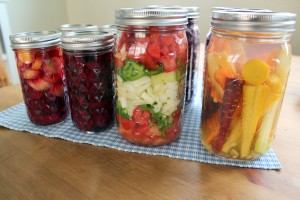
You’ve cut processed foods from your diet, and cut gluten too – just in case. You include probiotics in most meals. But you’re still experiencing digestive upset, skin issues, mood swings, or more.
For those with healthy digestive tracts, a balanced diet full of whole food is going to be plenty of nutrition, but there are still some things that can turn a healthy digestive tract into an unhealthy one, so you’ll not want to take it for granted!
But when the digestive system is damaged, through chlorine in the drinking water, antibiotic use, a lifetime of consuming processed foods, medication side effects, an autoimmune disorder, or more, a whole food diet can still inflame the gut and exacerbate problems.
If you’re trying to heal a leaky gut, you may get frustrated by symptoms not going away as quickly as you hoped. You may try eliminating this food, then that food, and then throw your hands up in the air. Before you give up on food entirely and switch to the {filtered} water only diet, check to see if you’re consuming any of the 5 foods that harm, and make sure you’re including the 5 foods that heal in your diet on a regular basis.
5 Foods That Can Harm Even The Healthiest Body
1. Artificial Colors. Linked to hyperactivity, cancer, and even reproductive issues, food dyes are especially bad for the young children that they often are targeted to. Substitute: Natural food dye in homemade frostings as needed. Many companies are now coming out with dye-free versions of medications and popular food items.
2. Artificial Sweeteners. Sweeteners made in a lab have not been tested long term, and may be linked to cancer, disruption to children’s brain development, learning disorders, and emotional/mental disorders. Substitute: Stevia may be used, but cutting back on sweet consumptions is best.
3. Chlorine in your drinking water. While I am thankful for easy access to clean water that is not full of pathogenic bacteria, the chlorine present in city water will also affect the microbiome. Solution: Countertop filtration system.
Read: 5 Signs Your Gut Flora is Out of Balance
4. Processed corn or sugar beets. Both GMO (genetically modified), these highly processed food products make their way onto grocery store shelves because they are CHEAP to use. They are cheap because they are subsidized by the government.
They harm the body because they are made with untested genetically modified strains, and they are highly processed until they are simple starch and sugar – they do not contain the trace minerals found in real food that is needed by the body to preform optimally. So, even if you eat enough enough calories, your body will still be left starved for nutrients and struggling to work correctly. Solution: Focus on meats, eggs, beans, vegetables, fruit, and healthy fats. Limit grain products to organic, whole grains that have been properly prepared.
Watch: King Corn
5. Butter Substitutes. Hydroginated oils sold as butter and lard substitutes are marketed as healthier alternatives to butter, but when we take a look again at the studies, we show that butter actually can help prevent cancer, heart disease, and promotes healthy brain development, and the artificial stuff causes cancer, heart disease, and gut problems. Solution: Real butter, lard, and coconut oil are healthy to include in your diet, and they taste great!

5 Foods That Harm if you have Leaky Gut
If your digestive system is top-notch and you don’t have chronic health problems, these foods most likely are going to be just fine for you to consume. But if you know you have trouble with autoimmune diseases, leaky gut, skin issues, or digestive trouble, staying away from these foods can really help.
1. Nuts. Because they are crunchy and salty like chips, convenient since they don’t need refrigeration, and used to make baked goods, it’s easy to fall into the trap of consuming too many nuts. Many people need to completely take a break from them until their digestive system has healed a bit more. Substitute: Beef jerky, dehydrated carrot or beet chips.
2. Dairy. If your body is having a morphine-like reaction to dairy, it could be responsible for your brain fog. If your gut is still leaky, and you’re not digesting dairy properly, it could be responsible for chronic sinus infections, a chronic runny nose, or more. Substitute: Coconut milk.
3. Grains. If you suspect leaky gut, or you have chronic health problems and you still are eating grains, it may be time to give them a break. There are so many grain-free options out there, doing a 30-day trial going grain free may be just what you need. Grains contain less healing nutrients than meat, vegetables, and coconut oil, and they also irritate and cause inflammation in the digestive tract and throughout the body for people with leaky gut. Substitute: A diet overhaul focusing on meats, veggies, fruits, and healthy fats is recommend over trying to re-create a grain-based diet with grain-free flour substitutes.
Pre-order my new book: 30 Days Grain Free for help doing a 30-day trial
4. Sweeteners. If you have a sweet tooth, it’s easy to consume way too many calories in sweeteners, even healthier sweeteners like honey, maple syrup, and unrefined cane sugar. The problem can be in the sweeteners themselves feeding yeast and other pathogenic bacteria that are rooted in your gut. It also is a problem because it displaces your consumption of healthy protein, fats, and vegetables with the nutrients and trace nutrients that come with them. Substitute: Kick that sugar habit first and foremost, but use stevia and date paste as needed to sweeten.
Read: The Microbes in your Gut are Screaming for Sugar
5. Nightshades. For those with autoimmune issues, members of the nightshade family (tomatoes, peppers, eggplant) contain too much lectin, which enters the bloodstream quickly, and exacerbates leaky gut. You can read more here at Paleo Mom, who knows much more about this than I do. Substitute: Non nightshade vegetables.
Read: The Gut-Autoimmune Connection

5 Foods that Heal
The good news is that we can swap out foods that harm for foods that heal. By keeping these foods on hand and including them in your daily cooking, you’re going to slowly but surely giving your body the nutrients needed to function optionally, and as your cells are replaced, you will be transforming to a healthy you from the inside out.
1. Coconut oil: Not long ago, this healthy oil had to be ordered online from specialty retailers. Now it is available at most big box stores, as people love the medium-chain fatty acids that are easy to digest, natural antimicrobial properties, and that it is a stable cooking fat that does not easily go rancid or burn when heated.
Absorbed easily into the bloodstream, many people find that this oil really gives them a sense of ‘I feel FULL and don’t want to eat any more’ that was missing from a diet that lacked in the specific type of oil that the body needed.
Bonus: This is an inexpensive way to get the calories and nutrients needed to heal the body. Add healing coconut oil to your cooked vegetables, use it in your baking, and use it to cook your eggs and meat in.
You can buy good-quality coconut oil here
2. Grassfed meats including liver and meat stock: Grassfed meat has a healthier balance of omega 3 and omega 6 fatty acids needed to fuel your body and repair and build cells. The absence of pesticides and other chemicals and antibiotics in the meat lets your body work on detoxifying the toxins in your own system, rather than adding them through food. Meat stock is an economical way to get the healing benefits of gelatin in a very usable form.
You can make meat stock yourself: recipe here (it’s easy)
3. Sea Salt: Switching out your iodized table salt for sea salt is a very simple switch, and it gets trace minerals in their naturally-occurring state into every meal.
You can buy good-quality Sea Salt here
4. Onions, Cooked: These staples in your pantry are inexpensive and have multiple compounds that heal the gut, help the body to detoxify, and reduce inflammation. (source)
Recipe: Sunshine Fritata with Caramelized onions
5. Real fermented vegetables, like pickles or kimchi. As more and more people are seeing lasting health benefits from consuming ‘live’ food, you can now find fermented vegetables, kombucha, and kefir on conventional grocery store shelves. When we consume vegetables, especially, that have been preserved by fermentation our bodies not only benefit from the live probiotics in them, but we also are better able to use the vitamins and minerals present as they are in more digestible form. Don’t think your kids would like them? You may be surprised! We all naturally crave a variety of flavors- not just sweet and salty- and these veggies will fulfill your need for the sour taste.
See how to easily make fermented food yourself here
Overwhelmed by this?
I put together a 30-day checklist to help you prioritize health changes while breaking them down into easy-to-manage steps that take only minutes each day. Click here and I’ll email it to you right away.
Plenty of Protein

Limited time offer: Enter your information and I'll send you my free e-book "Plenty of Protein" right away! This ebook contains 20 protein-rich low-carb recipes that your family is sure to love!


